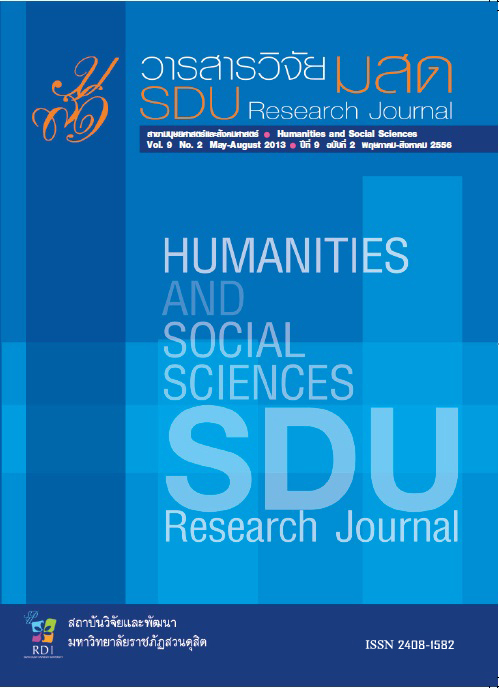การพัฒนารูปแบบการเรียนรู้เพื่อการเปลี่ยนแปลงภายในตนเองสำหรับการบำบัดรักษาผู้ติดสุรา
Keywords:
การเรียนรู้เพื่อการเปลี่ยนแปลงภายในตนเอง, การบำบัดรักษาผู้ติดสุราAbstract
บทคัดย่อ
งานวิจัยครั้งนี้มีวัตถุประสงค์เพื่อ (1) เพื่อศึกษาอำนาจการทำนายของปัจจัยที่เกี่ยวข้องกับการเรียนรู้เพื่อการเปลี่ยนแปลงภายในตนเองสำหรับการบำบัดรักษาผู้ติดสุรา (2) เพื่อพัฒนารูปแบบการเรียนรู้เพื่อการเปลี่ยนแปลงภายในตนเองสำหรับการบำบัดรักษาผู้ติดสุรา การวิจัยครั้งนี้ใช้วิธีการวิจัยแบบผสมผสาน กลุ่มตัวอย่างที่ใช้ในการวิจัยครั้งนี้ ได้แก่ กลุ่มผู้ติดสุราเรื้อรังนิรนามที่ผ่านกระบวนการบำบัดรักษาผู้ติดสุราจากสถานบำบัดรักษาทั้งภาครัฐบาลและเอกชน เลิกเสพสุราโดยถาวรมาเป็นระยะเวลาต่อเนื่อง ไม่น้อยกว่า 6 เดือน จำนวนกลุ่มตัวอย่างที่ใช้ในการวิจัยแบ่งเป็น 2 กลุ่มตามวิธีการวิจัย จำนวน 46 คน และ 7 คน ตามลำดับ เก็บรวบรวมข้อมูลด้วยแบบวัด การสัมภาษณ์เชิงลึกและการสนทนากลุ่ม วิเคราะห์ข้อมูลด้วยสถิติสหสัมพันธ์เพียร์สัน การวิเคราะห์การถดถอยพหุคูณและการวิเคราะห์เชิงเนื้อหา ผลการวิจัยพบว่า 1) ปัจจัยที่มีสามารถทำนายการเรียนรู้เพื่อการเปลี่ยนแปลงภายในตนเองสำหรับการบำบัดรักษาผู้ติดสุรา ได้แก่ สภาพโปรแกรมและการจัดกิจกรรมการเรียนรู้เพื่อการบำบัดรักษาผู้ติดสุรา การรับรู้ประสบการณ์การเสพสุรา การแลกเปลี่ยนเรียนรู้เพื่อการเปลี่ยนแปลงภายในตนเอง และแรงจูงใจเพื่อการปรับเปลี่ยนพฤติกรรมการเสพสุรา สามารถร่วมกันทำนายได้ คิดเป็นร้อยละ 47.6 และ 2) การเรียนรู้เพื่อการเปลี่ยนแปลงภายในตนเองของผู้ติดสุราที่นำไปสู่พฤติกรรมใหม่หรือการเลิกเสพสุราโดยถาวร สอดคล้องตามรูปแบบ 4-P Model ได้แก่ ลักษณะส่วนบุคคล การจัดโปรแกรมการเรียนรู้ การปรับเปลี่ยนกรอบความเชื่อและจิตลักษณะ และการเปลี่ยนแปลงภายในตนเองของผู้ติดสุรา
คำสำคัญ : การเรียนรู้เพื่อการเปลี่ยนแปลงภายในตนเอง/การบำบัดรักษาผู้ติดสุรา
Abstract
The purposes of this research study were to: 1) predict the factors related to transformative learning for rehabilitation treatment for alcoholics, and 2) develop the transformative learning model for alcoholic rehabilitation treatment. The sample in this study consisted of Alcoholics Anonymous Thailand (AA Thailand) participants who had stopped drinking for at least 6 months after finishing the treatment program; 46 alcoholics were used for quantitative data collection and 7 alcoholics were selected for qualitative data collection. finishing program treatment; 46 alcoholics for collected data by quantitative research approach and 7 alcoholics for collected data by qualitative research approach.
Research instruments were: 1) scales, 2) an in-depth interview, and 3) group discussion. Data were analyzed using Pearson product-moment correlation, multiple regression analysis, and content analysis. The research findings were as follow: 1) program and activities in alcoholic rehabilitation treatment, alcoholic experience, learning and sharing, and motivation for the change could explain 47.6% of variance in personal transformation; and 2) the alcoholics’ transformative learning leading to quitting smoke followed the 4-P Model. They were: 1) personal characteristics, 2) learning program, 3) adjusting beliefs and thinking, and 4) the alcoholics’ inner change.
Keywords:Transformative learning/Alcoholic rehabilitation treatment








